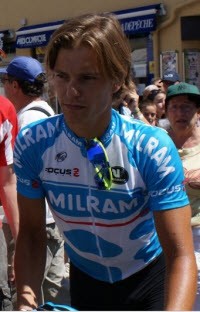 Germany’s only remaining ProTour team, Milram, is sponsored by Bremen-based dairy company Nordmilch AG. The company has been extremely supportive of their cycling sponsorship for Team Milram, but it looks like 2010 will be the end of the road for their involvement as the title sponsor for the team.
Germany’s only remaining ProTour team, Milram, is sponsored by Bremen-based dairy company Nordmilch AG. The company has been extremely supportive of their cycling sponsorship for Team Milram, but it looks like 2010 will be the end of the road for their involvement as the title sponsor for the team.
“As it stands, a contract extension is not appropriate,” said a company spokesman to Het Nieuwsblad. “We have plenty to discuss with team manager Gerry van Gerwen because we also want for the team to continue.”
Milram had a disappointing season in 2009, winning less than ten races and finishing eighteenth in the final rankings of the UCI World Calendar. The team will now have to rely on wildcard invites to several major races such as Paris-Nice, Milan San Remo and Liège-Bastogne-Liège, but is nevertheless looking optimistically towards 2010.
“Our aim for 2009 was 25 wins. With nine victories, we were far off that goal, so on paper, we cannot be satisfied with this season”, said team manager Gerry van Gerwen back in October.
Milram, which is a subsidiary of Nordmilch AG, had considered ending its sponsorship that was set to run through 2010 last year. Cancellation of important German races and the fact that the ARD and ZDF TV channels were attempting to boycott airing the Tour de France had left the company with little choice. Much to the surprise of the cycling community, the company decided to show their class and see the sponsorship through, saving many jobs in the process.
With the world economic situation in such a bad state, the dairy company looks like it will have no alternative but to cut back on their cycling sponsorship commitment, meaning there will be no renewal in 2011. Van Gerwen, though, remains positive about the possibility of finding another sponsor for their home team saying, “Germany is such a big country, and it’s bang in the middle of Europe.”
Cycling has lost several key sponsors in recent years, including French teams Credit Agricole and Agritubel as well as the German Gerolsteiner team. The potent mix of doping scandal and tough economic times have forced many professionals to hang up their bikes earlier than they might have otherwise. Though, the news is not all bad. Cycling has taken the initiative paving the way for the anti-doping movement with the UCI’s biological passport program and, when the economy recovers, will hope to take advantage of what has been a difficult exercise of facing reality and exposing cheats.